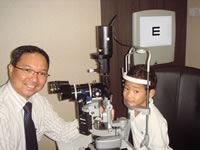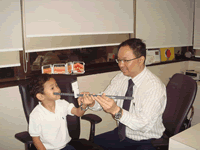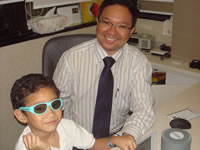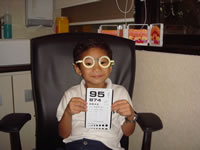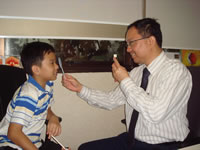Vision Screening Tests For Children
EYEWise Vision Clinic offers a comprehensive Visual screening test in children with reading difficulties and learning disabilities.
Learning disabilities have become an increasing personal and public concern in Singapore. Among the spectrum of issues of concern in learning disabilities, the inability to read and comprehend is a major obstacle to learning and may have long-term educational, social, and economic implications.
Early medical assessment and treatment is now available as more parents become aware of their children’s learning disabilities.
Sometimes children may also have treatable visual difficulty along with their primary reading or learning dysfunction. Routine vision screening examinations at an eye clinic can identify most of those who have reduced visual acuity due to correctable causes.
Dr Christopher Khng, is an affiliate of the Dyslexic Association of Singapore (DAS) (www.das.org.sg) since 2005. He has experience dealing with children with this learning difficulty for more than 10 years.
He performs vision screening tests for children who are under the various educational remedial programs like the Orton-Gillingham (OG), Cellfield, Hornsby and Audiblox approaches to remedial reading instruction and learning difficulty.
If you suspect your child has a learning disability, why not make an appointment for a visual screening test today?
Visual screening tests are for children who are 4 years old and above.
*What is Dyslexia?
(Adapted from www.wikipedia.org)
Identified by Oswald Berkhan in 1881, the term ‘dyslexia’ was coined in 1887 by Rudolf Berlin, an ophthalmologist practicing in Stuttgart, Germany. He used the term to refer to a case of a young boy who had a severe impairment in learning to read and write in spite of showing typical intellectual and physical abilities in all other respects.
In 1896, W. Pringle Morgan, a British physician, from Seaford, East Sussex, England published a description of a reading-specific learning disorder in a report to the British Medical Journal titled “Congenital Word Blindness”. This described the case of a 14-year-old boy who had not yet learned to read, yet showed normal intelligence and was generally adept at other activities typical of children of that age.[5]
During the 1890s and early 1900s, James Hinshelwood, a British ophthalmologist, published a series of articles in medical journals describing similar cases of congenital word blindness, which he defined as “a congenital defect occurring in children with otherwise normal and undamaged brains characterised by a difficulty in learning to read.” In his 1917 book Congenital Word Blindness, Hinshelwood asserted that the primary disability was in visual memory for words and letters, and described symptoms including letter reversals, and difficulties with spelling and reading comprehension.[6]
Please call EyeWise Vision Clinic now to fix an appointment.
About Dr Christopher Khng
Dr. Christopher Khng, specialises in Complex Cataract and Anterior Segment Reconstruction Surgery, in particular, Iris Reconstruction and Surgery for Aniridia. His other areas of expertise include Complex Lens surgery, New Lens and Phacoemulsification technologies, Refractive surgery, Phakic IOLs (the Implantable Collamer Lens, ICL), and small-incision, topical anesthesia phacoemulsification cataract surgery.
He completed his first two years of medical undergraduate studies in Aberdeen University, Scotland (UK), finishing top in his medical class in both years. Because of cost, he completed his medical degrees of MBBS at National University of Singapore (NUS).
Dr. Khng served as Registrar, then Associate Consultant Ophthalmic Surgeon at the Singapore National Eye Centre (SNEC). Following his stint in SNEC, Dr. Khng was a Consultant at The Eye Institute, Tan Tock Seng Hospital, Singapore.

Dr Christopher Khng
MBBS, M.Med(Ophth), FRCS(Edin), AMS(Ophth 2003) Consultant Ophthalmologist

